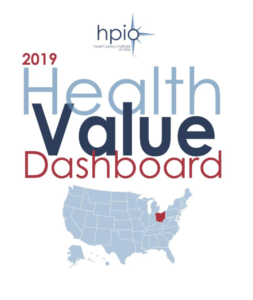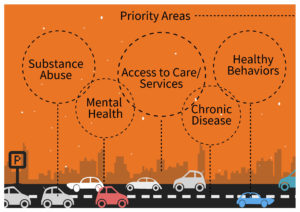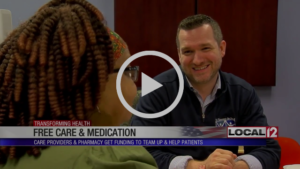bi3 Awards The Children’s Home of Cincinnati $280,000 to support the Mental Health Crisis Care Collaborative
bi3’s one-year planning and pilot grant will support The Children’s Home of Cincinnati, Beech Acres Parenting Center and St. Joseph’s Orphanage to create an effective and efficient model to connect families to pediatric mental health services following a crisis. The project will develop and pilot a single point of access to outpatient mental health care, as well as explore technology and sustainability solutions.
See the full grant announcement.
“Transforming Health” Series features bi3-sponsored partnership to address barriers to care
Earlier this month, bi3 and WKRC-TV/Local 12 collaborated to highlight an exciting and innovative collaboration between the Good Samaritan Free Health Center and St. Vincent de Paul Charitable Pharmacy to address barriers to care. This cutting edge partnership allows pharmacists to become an essential part of the care team to efficiently meet patients’ needs. Pharmacists can immediately manage medications for patients, decreasing wait time for prescriptions and reducing unnecessary physician visits and emergency care. It is a model that could be replicated across the state and country.
View all the “Transforming Health” stories.
Ohio ranks 46 out of 50 states on health value, according to the Health Policy Institute of Ohio’s Health Value Dashboard

The Health Policy Institute of Ohio’s Health Value Dashboard measures Ohio’s performance on health outcome and healthcare spending, as compared to other states. In 2019, Ohio ranked 46 out of 50 states — meaning Ohioans are less healthy and spend more on healthcare than people in other states. The report provides detailed information on Ohio’s health value strengths and challenges and identifies nine strategies to improve the state’s health value.
2019 Community Health Needs Assessment identifies substance use and mental health as top priorities
 The recently released 2019 Community Health Needs Assessment gathered data from individuals and organizations across the community to identify the top health priorities for the region. Top priorities identified include substance abuse, mental health, access to care and services, chronic disease and healthy behaviors. The process engaged over 1,400 people, 35 hospitals and 28 local health departments.
The recently released 2019 Community Health Needs Assessment gathered data from individuals and organizations across the community to identify the top health priorities for the region. Top priorities identified include substance abuse, mental health, access to care and services, chronic disease and healthy behaviors. The process engaged over 1,400 people, 35 hospitals and 28 local health departments.



